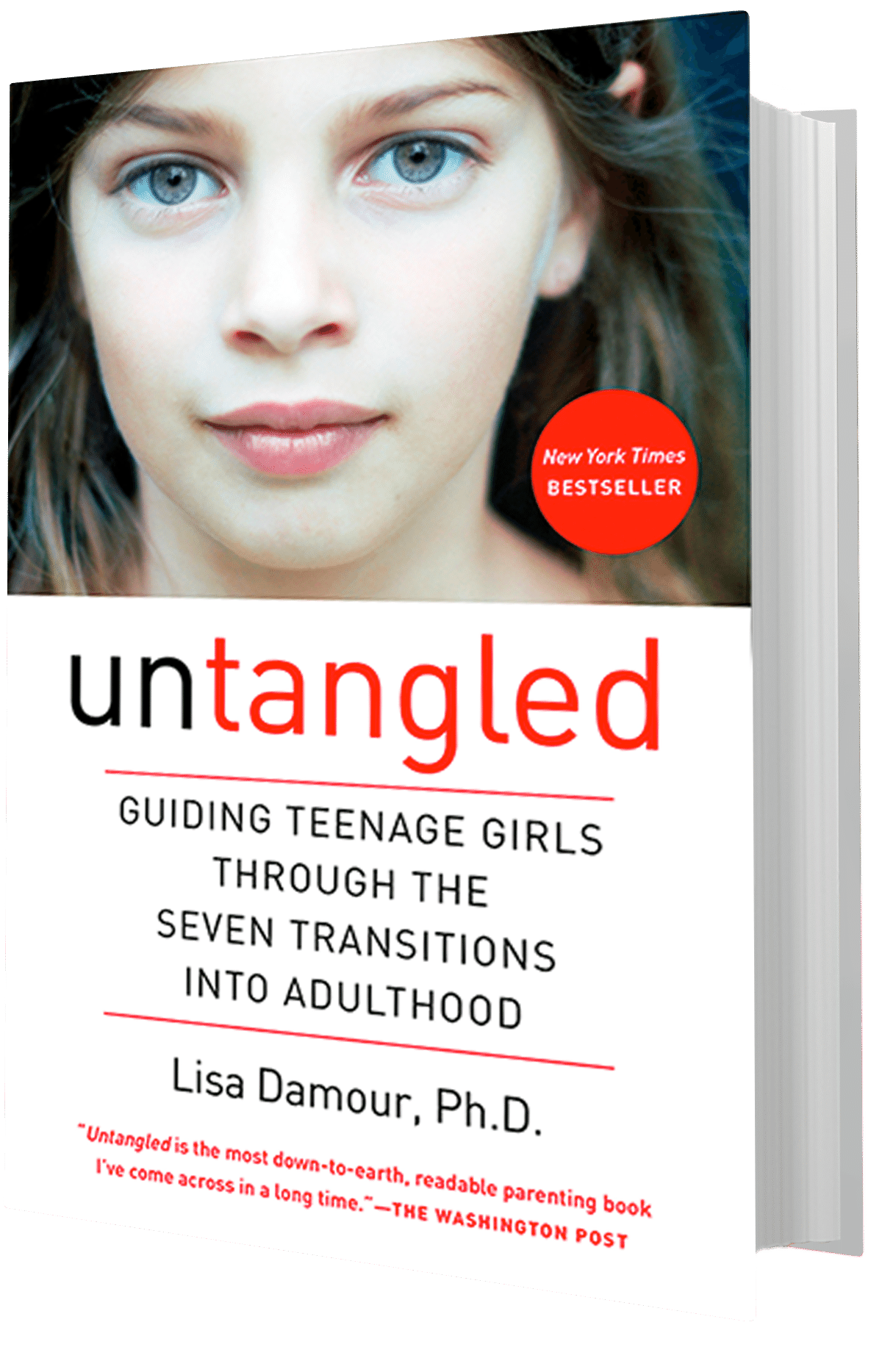Parents of teenagers must live with a painful truth: teenagers can and do engage in dangerous behavior—behavior that goes way beyond wearing questionable lipstick or a banned T-shirt. You’re not alone if you’ve lost sleep worrying that your daughter might get hurt if she and her friends decide to try out some of the careless things that teenagers sometimes do. More than a few parents secretly wish that they could lock their daughter away until she’s an adult or follow her around all weekend as her personal (and profoundly unwelcome) bodyguard....

Untangled Guiding teenage girls through the seven transitions into adulthood
Lisa’s award-winning New York Times best seller–now available in nineteen languages–is a sane, informed, and engaging guide for parents of teenage girls.
Buy nowThe most down-to-earth, readable parenting book I’ve come across in a long time.
Damour builds on and references solid research in psychology, but the heart of Untangled are the real-life examples and anecdotes from Damour’s decades of experience in counseling adolescent girls and their parents. Without preachiness or jargon, Damour illustrates how to talk to our girls, how to set limits, and how to respect and foster our daughters’ growing independence.
Such a welcome new resource.
Author Lisa Damour, director of Laurel School’s Center for Research on Girls, draws on stories of girls and their families to discuss ways to have constructive conversations. She also advises parents on what is cause for worry and what is not.
Parents will want this book on their shelves next to established classics of the genre.
Psychologist Damour begins this clear-sighted parenting guide with an epigraph from psychoanalyst Anna Freud: “There are few situations in life which are more difficult to cope with than an adolescent son or daughter.” In response, Damour offers a hopeful, helpful new way for parents to talk about—and with—teenage girls. More descriptive than prescriptive, the volume is anecdote-driven, featuring entertaining, insightful stories drawn from the author’s experience.
Untangled: The new bible of parenting books.
Untangled articulates a new perspective on what’s happening to your teenager – with friends, family, school, and much more. The book provides two essential tools – a roadmap for how parents can improve the day-to-day relationship with their teenagers, and the big picture of raising capable, young adults ready to be successful in the world. Untangled is comforting, without judgment, and above all, so wonderfully practical.
Expert information and counsel on helping parents raise well-rounded girls.
For parents who wonder why their delightful little girl has been replaced by an often belligerent, eye-rolling, disrespectful semiadult, Damour’s advice will be a great help. The author identifies how girls slide in and out of childhood as they test boundaries, how hanging out with peers can create conflict as well as a much-needed new tribe, and the benefits and problems surrounding social media, including the impact of bullying. She gives parents methods to broach difficult topics in a firm and understanding manner. Using Damour’s guidance, these transitional years will be far less fraught with angst and parents will be able to create stronger bonds with their daughters.
It’s a wise, funny, highly insightful guide to the mysterious minefield of adolescence.
If the teen years are a difficult passage, Untangled: Guiding Teenage Girls Through the Seven Transitions Into Adulthood seeks to map the journey, at least as it relates to girls. Lisa Damour divides this “tangle” into seven strands (parting with childhood, harnessing emotions, etc.) and offers wisdom drawn from her research and experience to help parents and, really, anyone who has girls in their care to understand and assist the process. Her advice is clear-headed, to the point and often surprising.
Dr. Damour expertly guides in the touchiest areas of development and social difficulties faced by parents of daughters.
Untangled is like having a 24/7 therapist at your beck and call. Dr. Damour tells you how to address the sensitive issues (privacy, friendships, harnessing emotion and how the teen brain functions; contending with adult authority; planning for the future; body perception; and entrance into the world of romance) that as a parent you may be reluctant to bring up, but feel are essential to discuss or address in some way.
In her New York Times best seller, Dr. Damour draws on decades of experience and the latest research to reveal the seven distinct—and absolutely normal—developmental transitions that turn girls into grown-ups, including Parting with Childhood, Contending with Adult Authority, Entering the Romantic World, and Caring for Herself. Providing realistic scenarios and welcome advice on how to engage daughters in smart, constructive ways, Untangled gives parents a broad framework for understanding their daughters while addressing their most common questions, including
- My thirteen-year-old rolls her eyes when I try to talk to her, and only does it more when I get angry with her about it. How should I respond?
- Do I tell my teen daughter that I’m checking her phone?
- Where’s the line between healthy eating and having an eating disorder?
- My daughter’s friend is cutting herself. Do I call the girl’s mother to let her know?
Perhaps most important, Untangled helps mothers and fathers understand, connect, and grow with their daughters. When parents know what makes their daughter tick, they can embrace and enjoy the challenge of raising a healthy, happy young woman.
Book Excerpt About Risky Behavior
Book Excerpt About School & College
The most immediate road to your daughter’s future runs through her life at school, and by nearly every available measure girls, as a group, do well academically. They get better grades than boys, are less likely than boys to repeat a grade or drop out of school, consistently outperform boys in reading and writing, do as well as boys in mathematics, are more likely than boys to enroll in college immediately after graduating from high school, outnumber male college students, and are more likely than boys to complete college....
 Untangled
Guiding teenage girls through the seven transitions into adulthood
Untangled
Guiding teenage girls through the seven transitions into adulthood
The advice provided by Dr. Damour here will not and does not constitute - or serve as a substitute for - professional psychological treatment, therapy, or other types of professional advice or intervention. If you have concerns about your child’s well-being, consult a physician or mental health professional.



